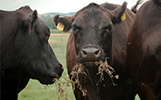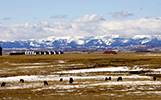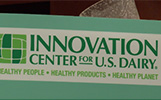| Livestock Industry Fights for Right to Be "Herd" 
Alice Rocha, The California Aggie | November 7, 2016
One of the most prominent issues in sustainable animal agriculture today is debunking the idea that not eating meat is the best way to reduce carbon emissions from livestock.
The amount of news articles claiming that meat will be the destruction of Earth has grown dramatically in the last few years. CNN, The Washington Post and many other news outlets have all released pieces against animal agriculture. Many of these reports have actually been revised because they presented incorrect information to the public.
The beef cattle industry bears the brunt of bad publicity, mainly around issues of water consumption and land usage.
Beef Sustainability Groups Strive for Global Reach
Barbara Duckworth, The Western Producer | November 10, 2016
The future of agriculture and the beef industry may depend on how diverse groups are able to work together and promote sustainable practices around the world. The Global Roundtable for Sustainable Beef was incorporated in 2013 and consists of producers, farm associations, processors, retailers, non–government organizations, as well as national and regional roundtables.
"You are bringing together people who want to work together," said global roundtable chair Dennis Laycraft of the Canadian Cattlemen's Association. "We are trying to bring together those who have a vested interest in the future of the industry, whether it is from those who are interested in biodiversity or those interested in resource usage or another group interested in climate change," he said.
CCA Report: Preparing for Climate Change 
Dan Darling, Canadian Cattlemen | November 15, 2016
In October, I travelled to New Zealand for the annual meeting of the presidents and chief executive officers of the International Beef Alliance (IBA). Comprised of the national organizations representing beef cattle producers in Australia, Brazil, Canada, Mexico, New Zealand, Paraguay and the United States, the IBA accounts for 46 per cent of the world's beef cattle production and 63 per cent of global beef exports.
The purpose of the IBA is to progress issues of common interest to ensure a strong and profitable global beef industry.
We spent a great deal of time discussing our shared concern about the growing level of anti–trade rhetoric amongst politicians and activists. I am pleased that this discussion culminated in IBA members agreeing to sign a reaffirmation of the alliance's statement of principles that confirm our shared commitment to trade liberalization, sustainable beef production and leadership development of young producers.
Sustainable Livestock Production: Veterinarians Play Critical Role
John Maday, Drovers | November 16, 2016
Facing that challenge, those food companies, producer groups, environmental organizations and others formed the Global Roundtable for Sustainable Beef (GRSB)in 2012. GRSB defines sustainable beef as "a socially responsible, environmentally sound and economically viable product that priorities planet, people, animals and progress." The group held its second global conference in Alberta in October.Although the GRSB focuses on beef, many of the same general principles apply to dairy production.
Throughout the conference, presenters discussed and debated methods for benchmarking sustainability indicators and measuring progress. While the topic is complex and sometimes divisive, one fact is clear: improving sustainability in agriculture requires reduction of waste, and resource use overall, across the production chain.
Ag Leaders Unite for Inaugural Sustainable Ag Summit 
Jamie Johansen, Animal AgWired | November 21, 2016
More than 500 farmers, retailers and other stakeholders in agriculture gathered for the inaugural Sustainable Agriculture Summit, co–hosted by the Innovation Center for U.S. Dairy, held last week in Atlanta, GA. For several years, dairy has brought together representatives of the full dairy chain – from farmer to retailer – to discuss opportunities to build consumer trust.
This summit engaged other farm sectors including beef, pork, poultry and crop. A primary focus of the summit was the need to tell dairy's and agriculture's sustainability story.
Their video report of the summit that includes quotes from dairy farmers Sue McCloskey and Steve Maddox as well as Chad Frahm, Senior Vice President of the Innovation Center for U.S. Dairy. See 2:41 video HERE.
Cattle's Impact on Soil Health Is Real and Valuable
Alan Newport, BEEF Magazine | November 9, 2016
When I first started learning about grazing management,the concept that most blew my mind was animal impact. Not anymore. I've seen it with my own eyes, and scientific documentation is growing steadily.
For those uninitiated to the term, animal impact is the cumulative effect of plant biting, saliva, urination, defecation, trampling and all the other things grazing animals do to plants and their habitat.
The idea that these things can be positive when applied in the right ways and right timing can best be understood by thinking about the immense herds in which ruminants lived and traveled in significant portions of the year, and the apparently high organic matter in prairie soils that resulted and are now degraded all over the world.
These days, those of us in the livestock industries should think about applying animal impact in terms of animal herd density, or stock density. That refers to the number of animals present in a paddock at one time, and it effectively compounds herd effect.
Not anymore.
I've seen it with my own eyes, and scientific documentation is growing steadily.
For those uninitiated to the term, animal impact is the cumulative effect of plant biting, saliva, urination, defecation, trampling and all the other things grazing animals do to plants and their habitat. | |
